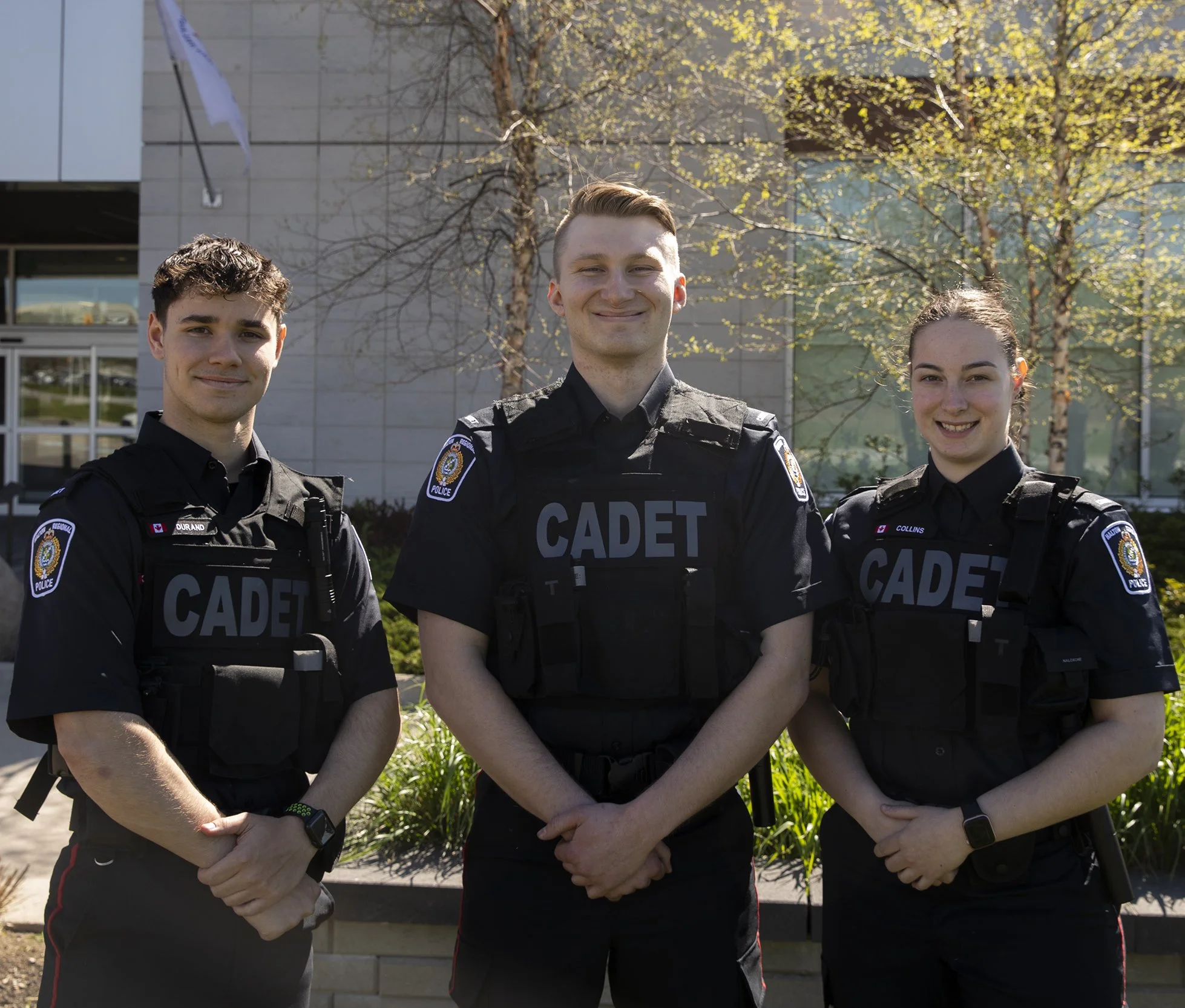Role of a Police Cadet
Work 12-hour shifts and follow the two days/two nights/four off schedule
Receive internal training and continuously work alongside coaches/mentor officers
Be part of a platoon team
Patrol in all districts and Central Lock-Up
Experience specialized units
Work special events throughout the Region
Participate in and speak at Recruiting Information Sessions and events
Learn new skills such as Defensive Tactics, Traffic Point Duty and Search Training
Work on fitness and wellness
Become a Cadet
Our Service re-established the 12-month Police Cadet Program in 2009 which sees participants undergo a structured and comprehensive selection process. Successful candidates are put through an internal training program followed by a series of diverse assignments throughout the Service. The program is designed to provide Cadets a window into policing, as well as continual guidance and mentoring, with the intent of preparing them to advance to becoming a Constable.
We’re now accepting Cadet applications year-round. If you’re an ambitious and motivated young adult with a serious interest in a policing career, we encourage you to apply here.
For more information about the HRPS Police Cadet program, contact: CadetProgram@haltonpolice.ca
-
The following are the mandatory requirements to be considered for the position of police cadet:
Be a Canadian citizen or permanent resident of Canada
Be 18 years of age or older
Be in good physical and mental health and able to meet the physical, mental and medical requirements of the HRPS
Be of good moral character and habits, meaning being an individual other people would look upon as being trustworthy and having integrity
Have successfully completed at least four (4) years of secondary school education or equivalent (Note: Official transcripts and diplomas will be required)
Where education has been completed outside Canada, official proof of equivalency must be obtained. Both International and Canadian applicants may obtain educational equivalency assessments through one of these agencies:
International Credential Assessment Service of Canada
35 Harvard Road P.O. Box 21001
Guelph, ON N1G 4T3
1-800-321-6021World Education Services Canada (WES Canada)
45 Charles Street East, Suite 700
Toronto, ON M4Y 1S2
416-972-0070
Toll Free: 1-866-343-0070 -
The following are additional mandatory requirements to be considered for the position of police cadet:
A valid Class ‘G' Driver's Licence
A Standard First Aid Certificate and CPR Level C
Be physically fit. Reach a minimum of Level 7 in the 20-Metre Shuttle Run and successfully complete the Police Physical Readiness Evaluation (PREP).
Meet vision standards of uncorrected visual acuity of at least 20/40 binocularly, corrected visual acuity should be at least 20/20 binocularly, and with normal colour vision
Meet normal hearing standards
Pass a detailed background check that includes security clearance, credit and reference checks.
-
Between the ages of 19-25 years of age
Recent post-secondary graduate or in the last semester of post-secondary education
-
Cadet | $53,026
Competencies of a Police Cadet
In addition to the minimum requirements, applicants for the position of Police Cadet must also possess certain essential competencies:
-
Resiliency: The ability to withstand adversity and bounce back from difficult life events and the ability to retain perspective and cope after a stressful event.
Teamwork: Works cooperatively with members of the work team. Contributes to the development of a team environment where team members achieve established goals.
Communication: Ability to demonstrate effective listening, understanding, verbal and written communication skills with a goal of de-escalation or reaching a common ground.
Problem Solving: Identifies problems, implements solutions and evaluates the outcomes. Discovers new opportunities and solutions for problems using innovative thinking.
Leadership: The action and ability to organize, influence, guide and motivate other people to reach a shared goal.
Inclusivity: Ability to recognize the value of diversity and the capability to relate and work effectively in culturally diverse situations.
-
Community Service Orientation: Desire to help or serve others and the ability to focus efforts on meeting individual and group needs
Initiative: Self-directed or self-motivated, and able to exercise initiative beyond what is expected or required on the job to improve outcomes or avoid problems
Work Organization: Ability to minimize errors and maintain high standards of quality by developing and maintaining effective systems for organizing work and information
Cooperation: Ability to demonstrate collaborative/team-oriented behaviour such as input seeking and information sharing with colleagues, other emergency services, community resources, etc.
Commitment to Learning: Ability to maintain and enhance professional/technical knowledge and personal development by asking questions, taking courses, reading, networking with colleagues, specialists, and the community
Assertiveness: Ability to use personal power or the power of the police constable's position appropriately to set expectations, challenge others, enforce rules, and direct others


